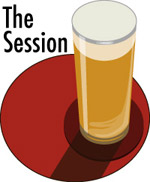 This month Mike Lynch of Burgers and Brews hosts The Session #46 and asks us to write about “An Unexpected Discovery.”
This month Mike Lynch of Burgers and Brews hosts The Session #46 and asks us to write about “An Unexpected Discovery.”
In the summer for 1995, Bozeman, Montana, was more of a beer destination than Rehoboth Beach, Delaware. Few had heard of Dogfish Head (located in Rehoboth Beach) or knew the face of Sam Calagione. Spanish Peaks Brewing distributed its beer nationally and Chugwater, the dog on the label, was sort of a star. Ribbons he had won in various competitions covered the walls at the Italian Cafe, the dining room attached to the brewery.
So we found ourselves at a stop light in downtown Bozeman. We didn’t have a GPS, let alone a phone app that would connect us to The Beer Mapping Project. But Daria was pretty sure we were supposed to turn right in a couple of blocks when, coming out of the light, I took a hard right to get into the parking lot we’d just be sitting in front of.
“What are you doing?”
“Look up.”
Above us the sign said Cat’s Paw Casino and advertised “microbrews,” guaranteeing 20 beers on tap at $1 each. Sure enough, they had beers from small breweries in Washington and Oregon, as well as California, and several imports. Each 10-ounce pour cost a buck.
If you were compiling a guide to places to find flavorful beer, as we were at the time, this was quite a discovery. As a beer drinking experience not quite so exciting. It was pretty much a dive bar (still is, apparently), with some pool tables and gambling machines in the adjoining room.
So a great and surprising experience? A few notes from a trip to California in December of 1994.
We were winding out way north on route 9 from Santa Cruz — and we do mean winding. This is not a road to attempt after a barley wine tasting. The late-afternoon fog hanging in the redwoods was delightful, but by the time we were north of Boulder Creek darkness had set in. We spotted a neon sign as we came around another turn, read the word “Bass” as we headed by and before we were around two more turns had doubled back.
We had found the White Cockade, a Scottish pub set in a log cabin. The fireplace crackled as Big Band music played softfly. Couples sat snugly at dimly lit small tables in a room paneled in knotty pine. A cat named Moggy wandered around. Sitting at the small bar, which was bedecked with World War II memorabilia, we were please to see Fuller’s London Price on tap. But our attention was quickly diverted by two other beer we had had on this trip. Double Dragon and Fuller’s ESB on nitrogen dispense. “Who’d have thought,” Daria said, “that we could got into a pub that had London Pride on tap and find two beers we wanted more than that.”
Sitting next to us was a local who watched with some interest as we ordered. he asked what we thought of British ales. He wanted to try them, but already knew California ales were too bitter for his taste. Since we had been to the altar of Cascade hops — Sierra Nevada’s taproom — just the day before, to hear a Californian talk this was as a reality check.
Sometimes the menu included fresh salmon, landed by the landlord from his own fishing boat, but last we heard the White Cockade was closed.
 This month Mike Lynch of Burgers and Brews hosts The Session #46 and asks us to write about
This month Mike Lynch of Burgers and Brews hosts The Session #46 and asks us to write about